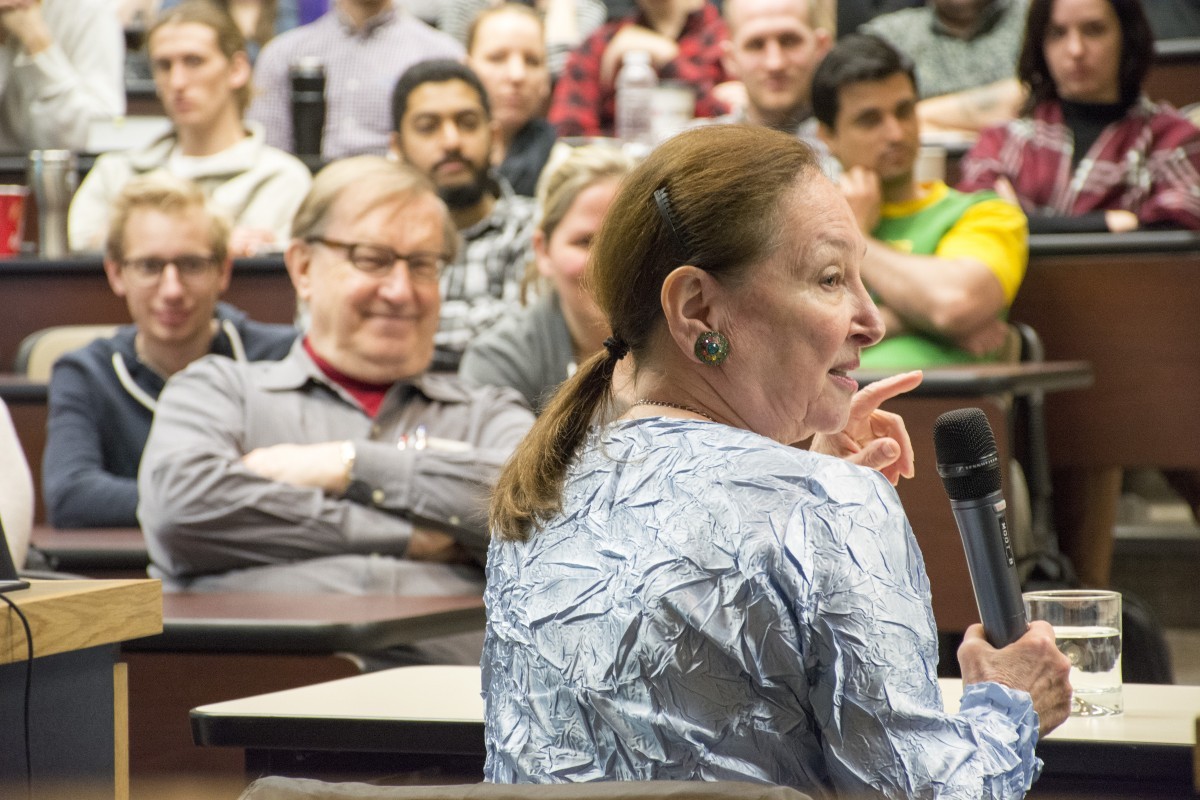
Supreme Court Justice Rosalie Silberman Abella shared her wisdom with Robson Hall students as part of Pro Bono Students Canada's 15-year anniversary.
PBSC Manitoba celebrates 15-year anniversary with SCC Justice Abella
Inspired speech, casual humour and poignant wisdom made Pro Bono Students Canada (PBSC)’s Manitoba chapter’s 15-year anniversary something to remember.
On Thursday, March 3, a moot courtroom full of staff, students and faculty hosted Supreme Court Justice Rosalie Silberman Abella and Manitoba Court of Appeal Justice Freda Steel for a “fireside chat”-format discussion on everything from employment equity to concentration camps.
PBSC National Director Nikki Gershbain introduced the justices, who kicked off the seminar speaking like old friends about Donald Trump, reality-TV politics, and the machinations of the Supreme Court of Canada before giving law students some tips on school, careers and life in general.
“Being a good lawyer isn’t about winning or losing,” said Abella. “It’s being confident you’re doing your best. Success will follow.
“You never know who’s going to win or lose a case – you never know how the judge will decide. Just be confident. You know the case in and out. You’ve been working it for months. The judge has worked it for two days. You’re the expert.”
On pro bono work, Abella warned against being unable to see the forest for the trees.
“Pro bono helps you stay close to people,” said Abella. “Not everyone immerses themselves in law like we do. Don’t get so wrapped up in the work you forget the reason you do the work – to help people.”
Abella also dispensed career advice, citing her invaluable experience as a family lawyer (and judge in family cases) and dispelling a common misconception that family law is a lesser form of law.
“When it comes to your career – don’t plan,” said Abella. “Just roll with it. Don’t be afraid of doing things. If I hadn’t done the things I’ve done – like family law – I wouldn’t be where I am now. I never worried about where I’d go next. I just enjoyed where I was, and I still do.
“What’s more important than family law? There exists some kind of strange hierarchy in the profession with corporate at the top, real estate near the top, criminal near the top – and family law at the bottom. I was always told family law is at the bottom – ‘when are you going to stop practicing family law and get to some real law?’, they would ask. My answer is that family law is law ‘plus’ – it’s law plus human emotion, plus human impact, plus compassion. It’s the hardest form of law.”
Abella spoke about her birth in a Stuttgart camp for displaced persons, her family’s experiences in concentration camps during the Second World War, and the dawn of her career as a lawyer.
“I knew I wanted to be a lawyer at age four,” said Abella. My dad was a lawyer in Poland, but he wasn’t allowed to practise in Canada. He took a job as an insurance agent. He never practised law again.”
Justice Abella’s extensive work on employment equity (a term she coined) ultimately led to her very own words being cited in a case knocking down the statute that had kept her father from practicing law in Canada.
Regarding pressing issues for the legal profession, Abella cited privacy – particularly in laws surrounding free speech and the advent of social technology.
“What worries me is that people don’t think free speech can actually limit free speech,” said Abella. “In the States, free speech is a religion. But discrimination can take the form of speech, and when you say things that bring the other person’s identity into disrepute – that’s dangerous.”
During the question period, second-year Robson Hall student Melody Burke asked Justice Abella about important attributes and skills future lawyers should carry forward into their careers.
Abella noted future-mindedness as a valuable quality.
“We’re the only profession that doesn’t change,” said Abella. “You could take a lawyer from 1906 and throw him – and it would be a him, because he’s from 1906 – into a courtroom and he would do fine today. Think of any other profession – medicine, engineering, transportation. It’s all changed. Doctors experiment with life and medicine to find better ways to save it.
“Future lawyers need to think hard about changing the ways we deliver justice – ways that haven’t really changed in a century. Things are still long, expensive and drawn out, just as they used to be. There are layers of appeals. We need to think about being more effective.
“Compassion is important. Understand how it feels to be at the mercy of the legal system. Be generous with your work. It’s one thing to be smart – be wise. Wisdom is knowing when and how to apply intelligence.”
According to Abella, devotion to legal service is vital for lawyers or judges.
“Justice is everything. Fairness is everything. As lawyers, you deliver that justice. Know the value of your service to the public and keep that knowledge locked away inside – wherever you go.”






